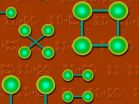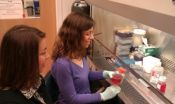World's blueberries protected in unique, living collection
2011-05-08
(Press-News.org) Familiar blueberries and their lesser-known wild relatives are safeguarded by U.S. Department of Agriculture (USDA) scientists and curators at America's official blueberry genebank. The plants, collected from throughout the United States and more than two dozen foreign countries, are growing at the USDA Agricultural Research Service National Clonal Germplasm Repository in Corvallis, Ore.
The blueberries are maintained as outdoor plants, potted greenhouse and screenhouse specimens, tissue culture plantlets, or as seeds, according to research leader Kim E. Hummer.
The genebank's purpose is to ensure that these plants, and the diverse genepool that they represent, will be protected for future generations to grow, enjoy, study and improve. For example, plant breeders can use plants in the collection as parents for new and even better blueberries for farm or garden.
Blueberries and several other small berries are among the fruit, nut and specialty crops housed at the Corvallis repository, which in turn is part of a nationwide, ARS-managed network of plant genebanks.
Likely the most comprehensive of its kind in the United States, the blueberry collection nevertheless continues to expand, Hummer reports. Some acquisitions, referred to as accessions, are donations from breeders. Others are acquired through collecting expeditions, which have taken plant explorers to Russia, China, Ecuador and Uruguay, among other places, as well as throughout the United States to find new blueberry plants for the repository.
The collection includes species of wild blueberries native to the Pacific Northwest that have pigmented flesh or pulp. Some breeders are trying to breed some of these species into the familiar highbush blueberry that has a white interior, Hummer noted.
If breeders can put color on the inside of berries through cross-breeding the internal-color berry plants with highbush plants, the breeders may be able to produce a berry that gives fuller color to processed blueberry jams, jellies, juices and dried or frozen fruit.
Other prized specimens at the genebank may someday become landscaping favorites. One example: low-growing Vaccinium praestans from Russia, China and Japan. Also known as redberry Kraznika or rock azalea, it could make an interesting, attractive ground cover that comes complete with edible fruit.
INFORMATION:
Read more about this and other blueberry research in the May/June 2011 issue of Agricultural
Research magazine.
http://www.ars.usda.gov/is/AR/archive/may11/blueberries0511.htm#collection
ARS is the USDA's chief intramural scientific research agency.
USDA is an equal opportunity provider, employer and lender. To file a complaint of discrimination, write: USDA, Director, Office of Civil Rights, 1400 Independence Ave., S.W., Washington, D.C. 20250-9410 or call (800) 795-3272 (voice), or (202) 720-6382 (TDD).
END
ELSE PRESS RELEASES FROM THIS DATE:
2011-05-08
This release is available in French.
Montreal May 5, 2011 – Children whose mother or father is affected by bipolar disorder may need to keep their stress levels in check. A new international study, led by Concordia University, suggests the stress hormone cortisol is a key player in the mood disorder. The findings published in Psychological Medicine, are the first to show that cortisol is elevated more readily in these children in response to the stressors of normal everyday life.
"Previous research has shown that children of parents with bipolar disorder are four times ...
2011-05-08
WASHINGTON -- How can some people respond to a question without answering the question, yet satisfy their listeners? This skill of "artful dodging" and how to better detect it are explored in an article published by the American Psychological Association.
People typically judge a speaker with the goal of forming an opinion of the speaker, which can make them susceptible to dodges, according to the study published online in the Journal of Experimental Psychology: Applied. Limited attention capacity is another reason people fall for dodges, said the authors, citing a previous ...
2011-05-08
A Swedish research team partly consisting of researchers from Uppsala University followed a group of prostate cancer patients in the Nordic region for 15 years. The study found, among other things, that surgery reduces the risk that men with prostate cancer (even those with low-risk tumours) will die within 15 years. The results were published today in the New England Journal of Medicine.
The researchers followed Swedish, Finnish and Icelandic prostate cancer patients. Radical prostatectomy (surgical removal of the prostate gland) was performed on 347 randomly chosen ...
2011-05-08
Researchers from the Vienna Center for Quantum Science and Technology at the University of Vienna and the Institute of Quantum Optics and Quantum Information at the Austrian Academy of Sciences used a quantum mechanical system in the laboratory to simulate complex many-body systems. This experiment, which is published in Nature Physics, promises future quantum simulators enormous potential insights into unknown quantum phenomena.
Already the behavior of relatively small quantum systems cannot be calculated because quantum states contain much more information than their ...
2011-05-08
CHAPEL HILL, N.C. – Researchers at the University of North Carolina at Chapel Hill School of Medicine, after isolating normal stem cells that form the developing placenta, have given them the same properties of stem cells associated with an aggressive type of breast cancer.
The scientific first opens the door for developing novel targeted therapies aimed at triple negative breast cancer. Known also as TNBC, this is a highly recurrent tumor that spreads aggressively beyond its original site in the breast and carries a poor prognosis for patients who have it.
The study ...
2011-05-08
An international team of researchers co-led by a University of Minnesota scientist has sequenced the genomes of two fungal pathogens -- one that threatens global wheat supplies and another that limits production of a tree crop valued as a future source for biofuel.
The sequencing of the genetic codes of wheat stem rust pathogen (Puccinia graminis) and poplar leaf rust pathogen (Melampsora larici-populina) is expected to help researchers develop control strategies to address worldwide threats to wheat fields and tree plantations. The study, which was published this week ...
2011-05-08
Know thyself. That was Socrates' advice, and it squares with conventional wisdom. "It's a natural tendency to think we know ourselves better than others do," says Washington University in St. Louis assistant professor Simine Vazire.
But a new article by Vazire and her colleague Erika N. Carlson reviews the research and suggests an addendum to the philosopher's edict: Ask a friend. "There are aspects of personality that others know about us that we don't know ourselves, and vice-versa," says Vazire. "To get a complete picture of a personality, you need both perspectives." ...
2011-05-08
As the use of biotechnology increases and more companies move forward with the U.S. Environmental Protection Agency's approval to begin full-scale commercialization of seed mixtures in transgenic insecticidal corn, many researchers believe pest monitoring will become even more difficult.
"Seed mixtures may make insect resistance management (IRM) risky because of larval behavior and greater adoption of insecticidal corn," said David Onstad, professor in the Department of Crop Sciences at the University of Illinois and lead author in a recent article published in the Journal ...
2011-05-08
AUSTIN, Texas—Computer networks that can't forget fast enough can show symptoms of a kind of virtual schizophrenia, giving researchers further clues to the inner workings of schizophrenic brains, researchers at The University of Texas at Austin and Yale University have found.
The researchers used a virtual computer model, or "neural network," to simulate the excessive release of dopamine in the brain. They found that the network recalled memories in a distinctly schizophrenic-like fashion.
Their results were published in April in Biological Psychiatry.
"The hypothesis ...
2011-05-08
More than 20 percent of atheist scientists are spiritual, according to new research from Rice University. Though the general public marries spirituality and religion, the study found that spirituality is a separate idea – one that more closely aligns with scientific discovery – for "spiritual atheist" scientists.
The research will be published in the June issue of Sociology of Religion.
Through in-depth interviews with 275 natural and social scientists at elite universities, the Rice researchers found that 72 of the scientists said they have a spirituality that is ...
LAST 30 PRESS RELEASES:
[Press-News.org] World's blueberries protected in unique, living collection

